What I was playing during the festivities on the final night of The Castanet Club exhibit at Newcastle Museum. Three hours of uncool cool. With smatterings of Castanet Club and Musical Flags tracks.
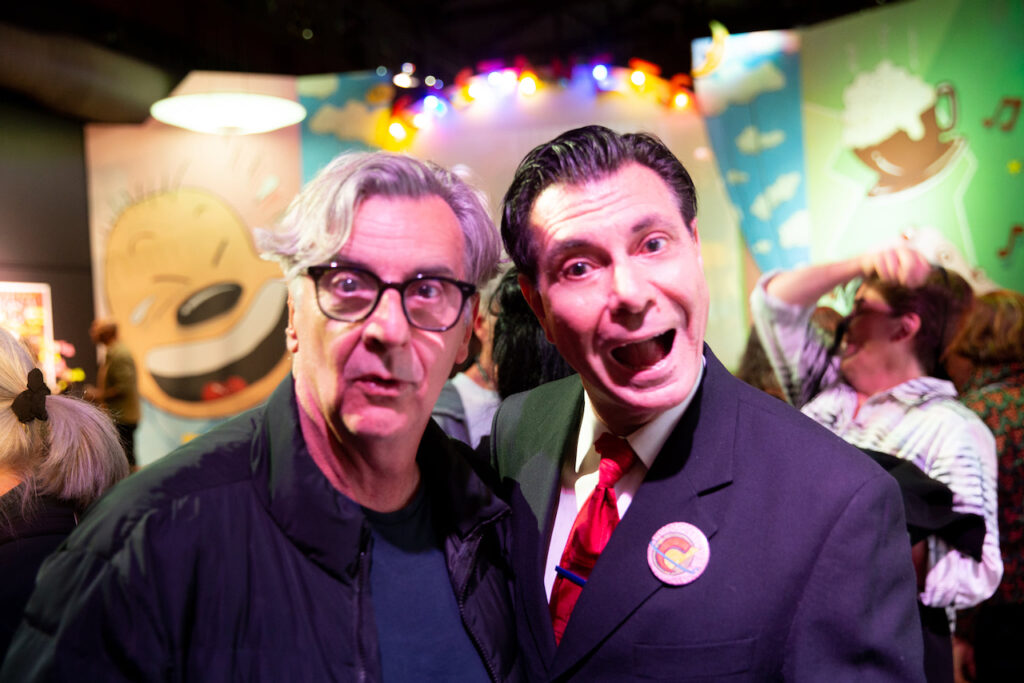
What I was playing during the festivities on the final night of The Castanet Club exhibit at Newcastle Museum. Three hours of uncool cool. With smatterings of Castanet Club and Musical Flags tracks.

Podcast: Play in new window | Download
Subscribe: Email | TuneIn | RSS
Bunga Bunga 68 drags you out of lockdown and into the bright light of something shiny but cheap.
Tim Ferguson & Maynard will lift you spirits and lift your shirt. They will tell you what happened, what is happening and what will happen.
Sweden is insulted.
Support Bunga Bunga and Planet Maynard by becoming a Patreon
Podcast: Play in new window | Download
Subscribe: Email | TuneIn | RSS
Chit Chat von Loopin Stab and Tony Whittaker have made the best (and only) documentary on The Castanet Club. The Castanet Club Story.
Chit Chat drops in to tell Maynard the story behind the Story.
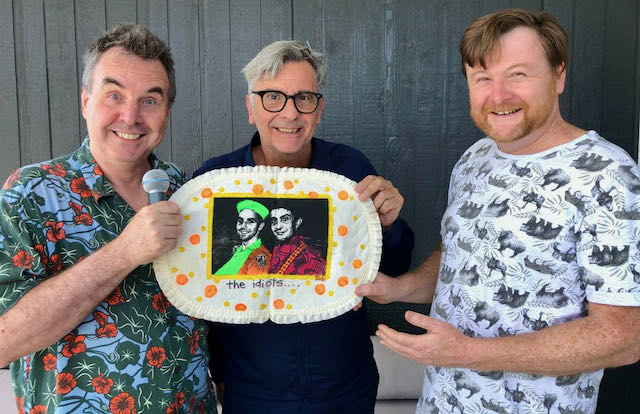
Just look at what he wrote about us…
What The Castanet Club achieved in their 9 years would impact the landscape of Australian entertainment for the next 20yrs. The rise of Triple J, Sandman and Flacco, Young Einstein, Good News Week, Channel [V], Play School, Sale of the Century, Full Frontal, Happy Feet, Fast Forward, Kath, and Kim and even Mambo T-shirts are in some way connected to this remarkable group of unfashionable humans.
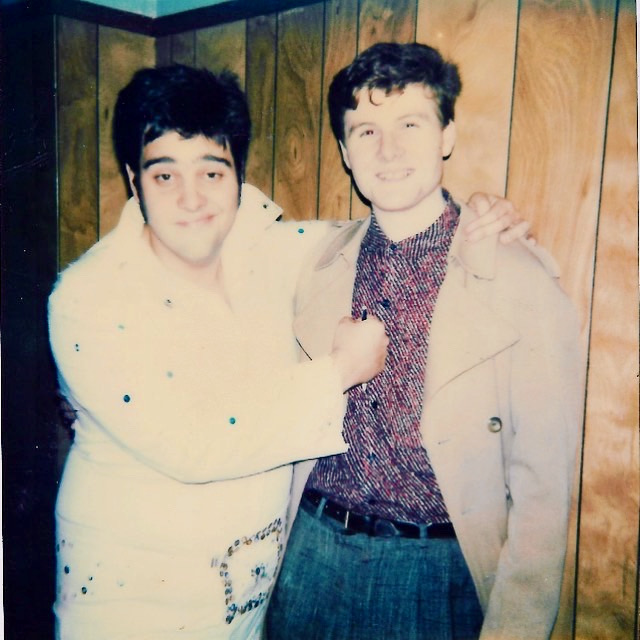
Half hour Castanet Club Story documentary with lots of interviews with members and even Tim Ferguson, Paul Livingston, John Doyle & Jane Turner turn up to talk about Castanet Club history and what we are doing now…
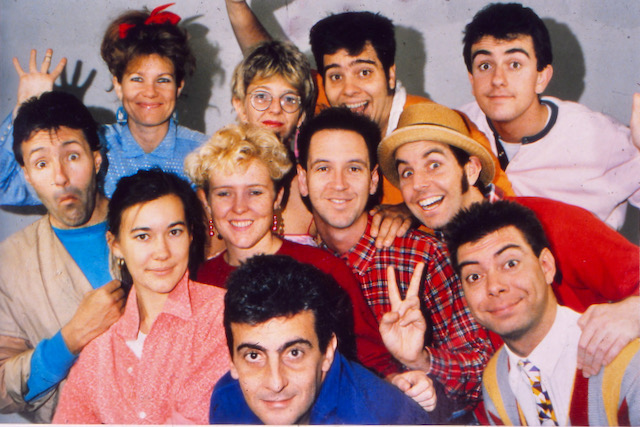
Maynard presents a video show with Castanet Club archival footage and influences.
On Maynard’s latest video livestream he took the attention temperature of Australia’s cats to, anything really. Whatever you are doing that doesn’t involve feeding them does not impress.
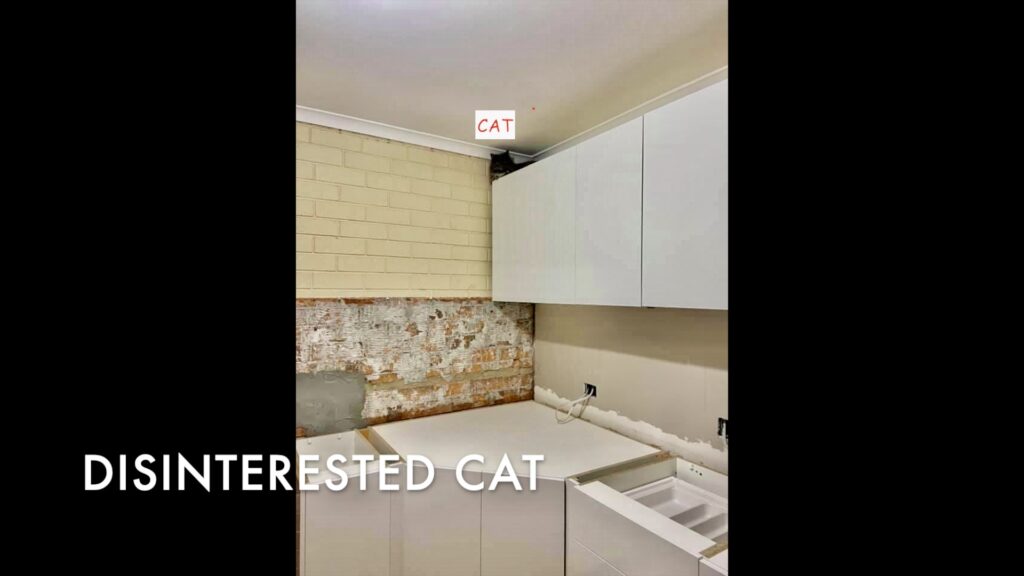
Maynard celebrates his opening up, and we all find out how excited the people and cats of Australia are about that.
The whole shabang has a heap of great tunes, fun and foolishness.
Lots of guests, including Tim Ferguson, George Hrab, Tony Push, Richard Saunders (dancing) and introducing Leslie Fountain as our new “choreography correspondent”.
There is an unseen version of Venus from The Castanet Club from 1986 that will give you some lighting tips.
Also thrill to Tea Towel Time and the Smart Ass Quiz with my silent co-hosts hippo Anderson Cooper and teddy Noam Chomsky.
Bring your cat.
I promise average entertainment for no apparent reason.
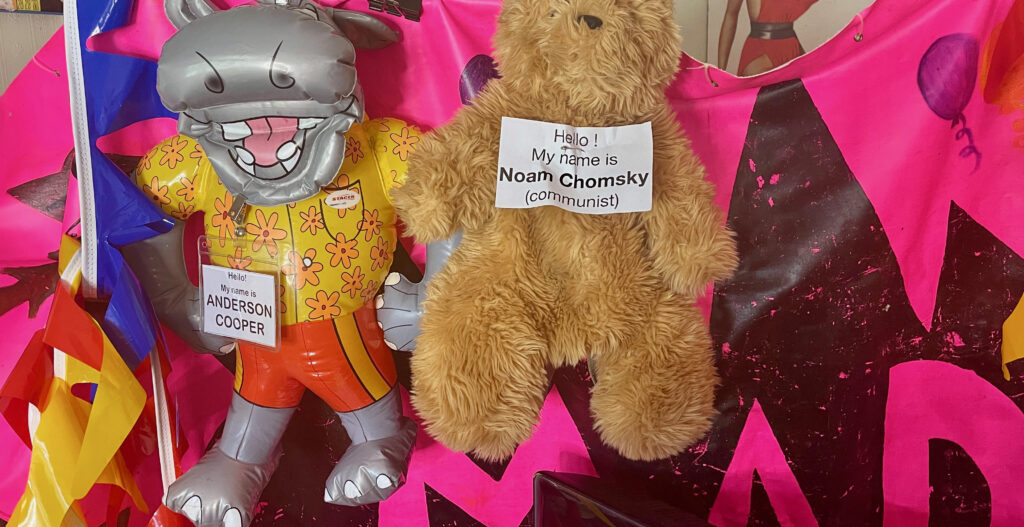
Maynard is questioned about his musical choices by Charlie Fatt. Dig some Electric Six, B-52s, Mari Wilson AND Sammy Davis Jnr finally together on the same show.
Podcast: Play in new window | Download
Subscribe: Email | TuneIn | RSS
Nastassja Bassi (Jacqueline Amidy) who I haven’t seen for more than 30 years drops into Maynard International Studios to deconstruct and celebrate her time with the Castanet Club 1985 -1990.
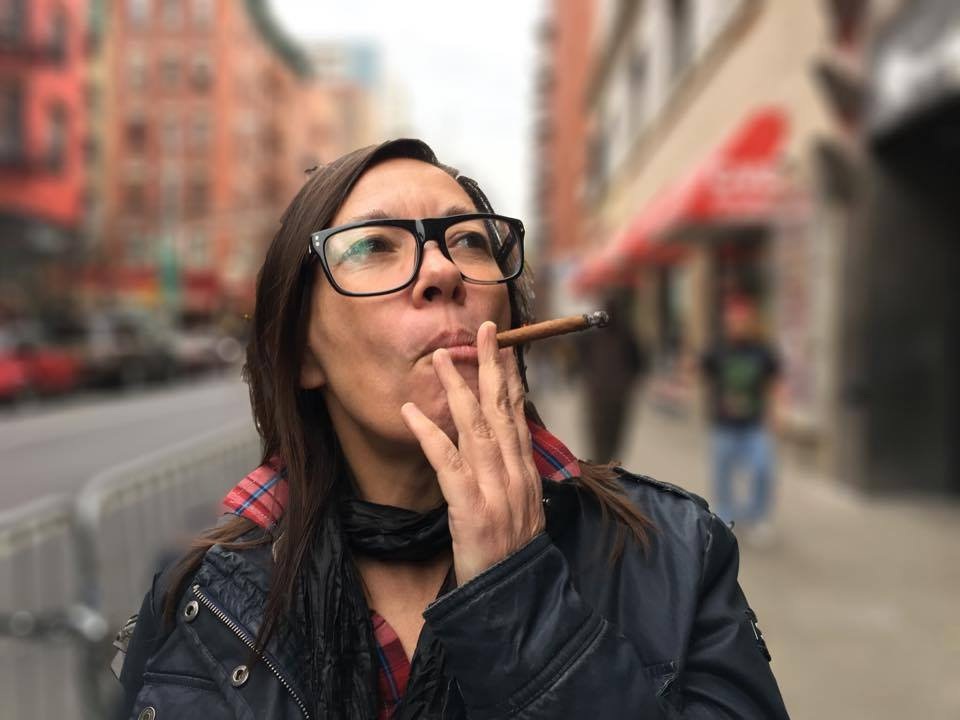
The Castanet Club was more than theatrical, it was cinematic.
Natassja Bassi (Jacqueline Amidy)
For those fancy pants people who like to read, here is a heavily edited transcript of our conversation.
Maynard: One day you’re in your lounge room and you turn around and there’s someone you haven’t seen for 34 years standing at the door. Jacquie. Good to see you.
Jacqueline: How long has it been?
Maynard: 36 years ago. Since I’ve seen you.
Jacqueline: I was born about then. So I don’t know how that works.
Maynard: You are in Maynard International Studios. I’ve the same nervousness with you that I had with when Warren Coleman came over to the studios as well.
Jacqueline: Well, I’m real.
Maynard: Is there something you could point out to people?
Jacqueline: The hell? I’m not sure what to make of this I’m looking at, is that a signed Kylie single? There’s a photo of you and Kylie underneath at the Double Bay hotel. Is that the one that Michael died at? I blame you.
Jacqueline: I like your speakers. Very seventies speakers. So I’m sitting on the seventies lounge. I actually think I’ve sat on this lounge somewhere else. In my past. I’m really loving it. I’m going to use the word juxtaposition of seventies, sixties and fifties.
Maynard: Cross-generational carpets here as well. I’ve only, just recently got the CDs into order. They’re all actually in decades etc.
Jacqueline: I don’t think I have seen CDs for a long time.
Maynard: When I say CDs, people say, what?
Jacqueline: I’ve got a CD player in my 2004 Mercedes Compressor, black, black interior, two door, sexy. I do like cars in the last year I’ve had five cars.
Maynard: You strike me as being a station wagon woman.
Jacqueline: I love a station wagon. That’s what upsets me so much about the coupe. I can’t drive along and pick things up from the side of the road. I like freebies.
Maynard: I’ve got you here because we’ve have the Castanet Club exhibition come up. We’re talking about the Castanet Club time. I was just doing crazy dancing up the back.
Jacqueline: Everybody in the Castanet Club was extremely complex.
Maynard: Is there a great stage memory? Of course, Wuthering Heights was almost a signature piece for you.
Jacqueline: Thinking about it, my role was show stopper. I did all the show-stopping songs, Devil Gate Drive etc. I was in the second coming of the Castanet Club. We really put it together as a theatre show. We got a real director.
Maynard: That’d be Neil Armfield.
Jacqueline: We were in a theatre and a very cool theatre. Belvoir Street was at that stage, I think THE theatre.
Maynard: Yeah.
Jacqueline: An RSL club band in a theatre.
Maynard: That was one of the great things about the Castanet Club. We could do shows at an RSL, and we could go and do a theatre season at the Playhouse or at Belvoir Street and we could make it work.
Jacqueline: Do you remember when we did the tour of the Western suburbs RSL clubs?
Maynard: We did three or four. Way out west? We were driving for two hours.
Jacqueline: I do remember going to Rooty Hill RSL because I did work out that way. I drove past it daily, and every day, every day I had the same memory. Everybody going, who the hell is this band? I remember walking in and they just looked at us like who, the frick are these people?
Maynard: You aren’t thinking about Tweed Heads RSL?
Jacqueline: I think we were very successful there. That was very different. But we did have the people from the old people’s home, who spent the whole time with their fingers in their ears, looking very pained, especially when I sang Wuthering Heights. I do remember that that was a very strange season.
Maynard: We did win over a lot of fans there.
Jacqueline: It’s was kind of coals to Newcastle. Sorry to use that word.
Maynard: What was your favourite gig? Did you have one? Was it at one of the festivals?
Jacqueline: That would’ve been Perth. That festival was my favourite because it was the first time I drank alcohol. That was the outside one? We were playing at the University.
Maynard: A big deal was made of the fact that you were having a drink for the first time.
Jacqueline: I was on the piss mate. I was only on the piss because we were playing in a quadrangle and they kept telling us that it was a Shakespearian theatre, but in fact it was just a quadrangle of the University. Well, it was so packed. It was so packed. They were hanging off the rafters. Backstage wasn’t really a green room, it had nothing.
They only had beer and champagne and no water and nothing else that I could drink. I’m the singer in the band and I’m just going, “can we just get like a mineral water or something?” They couldn’t can’t get from the stage to the bar. There were so many people at that gig. There’s pink champagne though.
Maynard: So you thought pink champagne, what harm can that do?
Jacqueline: I started drinking it, and instantly I fell in love with it, and I got drunk. Then we were going to a party which was the Festival party. I think Glen was driving. We got to the party.The funniest thing of the party was, at that time, Kate Ceberano and I, people always got us mixed up.
People would think when we went out in those festivals, people would always think I was Kate Ceberano. I don’t know why, cause I don’t have tits and I’m all skinny. She had huge tits, huge everything. I wasn’t huge at all, but we were both kind of dark and swarthy I suppose. People thought she was me.
I do remember meeting her because she was a good Christian woman.
Maynard: Scientologist.
Jacqueline: Same thing.
Maynard: Don’t say that to a Catholic, that’ll start a fight.
Jacqueline: I am a Catholic. Anyway, I remember meeting her and we were kind of, “it’s you”, we started a conversation now I was trashed and this was my first time I had alcohol. I told Kate “I’m going to the toilet, stay here”. Well, I went to the toilet. I realised that when you get drunk things shift, so I’m sitting on the toilet and it was all swirling around my head.
Then I came back and she’d gone. I’m thinking what happened? That was my first experience with alcohol.
Maynard:I’m sure Kate Ceberano remembers that night.
Jacqueline: I’m sure she does. There were some incredible times. There were many, like when we’re at Belvoir Street, one of the first shows I ever played. They started the show without me. I’m out talking to somebody and they start Devil Gate Drive and I’m still at the bar.
I got to the stage, I ran to the front of the stage. Onto my knees and slid to the front of the stage and grabbed the microphone.
Who would start the show without the singer? That was great, but the most incredible time I ever had oh, which was at Balmain RSL Club.
Maynard: A great venue, a big cavernous venue with a huge stage, plenty of room for all the Castanets.
Jacqueline:It was around the corner from the Bijou . Where Betty Blockbuster had been. That’s where Reg Livermore did that big show.
That theatre was one of the first theatres closed down because of the people who’d moved when it was gentrified. They moved in and they made them close the theatre down.
And it was just around the corner from the RSL, which was a fabulous venue. I loved playing Balmain, but I remember one night and nobody will remember this, but I had a transcendental experience on stage, truly.
Maynard: You always were quite spiritual about your singing in the first place. So it doesn’t surprise me that you had this transcendental experience. What song were you singing and was it a particular part of the song? What happened?
Jacqueline: (long pause and intake of breath…) I’m a very serious singer. I take what I do very seriously. When I sing, I always put everything into a song. That was a beautiful thing about the Castanet Club, though there was this crazy shit happening. I mean, you know, I was this diva up the front, and behind me, people were pulling their pants down and running around like fucking idiots.
I remember this night and I think maybe it was Work Song.
Maynard: Work Song, which is on the album.
Jacqueline: I was in the middle of the stage and they were packed to the rafters. When we played, it’s really hard to explain what a Castanet Club audience was like, because the Castanet club audience was the show. We were the ancillary to the audience.
I remember this night we were playing Work Song and I really deeply got into it. It used every part of my range, I was like the biggest show off diva.
It was incredibly taxing to sing this song and a really hard song to sing. I always wanted to sing it at the absolute max. Every time I wanted to do it better and to show off a little bit more. So I remember I would do a lot.
On the stage it was always very quiet at the start. Then it built as a song and as the sax solo built, everybody went fricken crazy on the stage.
I can remember I closed my eyes and I know it sounds weird, and I wasn’t on drugs or drinking, but I left my body. This really happened. I think it a rarely, rarely happens in anyone’s life, but I actually left my body.
I’m floating outside my body looking down at us on stage because I think I was singing so beautifully that night. I’d gotten myself to another level of singing and I moved out of my body.
I’m sitting there, I’m watching, I mean, oh my God! Oh my God! I’m having this experience. Oh my God. Oh my God. Oh my God. I was probably hyperventilating.
Maynard: I’m suggesting medically perhaps it was a minor oxygen deprivation going on.
Jacqueline: Of course, I know that NOW. In retrospect it was, but at that time it was transcendental. Then I came back into my body….
I remember opening my eyes and I’m thinking “what the F did anybody see that?” And you all had your pants down and were running around like crazy people around me. Nobody even fucking noticed that I was out of my body and floating around.
I was in another time zone and you’re all doing your own shit and going about knocking things over and bumming each other or whatever you were doing, it was crazy. That was a moment of knowing I’m truly alone on this stage. Really like, look at me with these bunch of idiots. I’m truly alone on this stage.
Maynard: Another thing you did in the band, you, were one of the main bass players.
Jacqueline: Well, I was the funky ass bass player Maynard. Let’s get that correct.
Maynard: What songs were you laying down the funk to?
Jacqueline: Every song I played mate. I love the bass. I’ve said to my students over the many years, if you want to be sexy, you play the bass.
Maynard: Because you’d have the evening gown and you’d be playing the bass. The fez too.
Jacqueline: Castanets is why I started playing bass. Did I ever tell you how I joined the Castanet Club.
Maynard: No.
Jacqueline: Well, I was a special guest, so I used to come along as special guest with my piano player, Vince. We would come and do my version of many songs, jazz songs and that’s where I started Wuthering Heights with him. Whenever we played, it went off.
So you guys, when you were going to the Edinburgh Festival in 1984, who is your bass player? Pete
Maynard:Pete Mahony, otherwise known as Mr Urstwhile.
Jacqueline: Urstwhile had decided he wasn’t going to go. He decided he wasn’t going to be in the Castanet Club anymore.
He left the band momentarily. You guys contacted me. And you said, because I played guitar because I’d been a singer around town and I played guitar quite well, They asked if I played bass? I said, ah, okay, Yes, I can play bass. I mean, it’s just a four string guitar after all….
Maynard: Which for anybody in the entertainment game, that is exactly the answer you always give. Can you juggle and ride a unicycle? Sure! Because you get more work that way.
Jacqueline: So they said, we’ll find you a bass so you can learn all the songs. They found me a bass from Bart Fox.
Maynard: Bass player with Musical Flags and first Castanet Club bass player.
Jacqueline: He had a bass and they gave me his bass. Now I knew nothing about the bass electric guitar at that stage. And I did not realise that the action of a bass electric guitar shouldn’t be five inches from the neck. It was an impossible guitar to play, but I didn’t know.
So I’ll learnt the whole Castanet Club repertoire on this unplayable bass. I must’ve had muscle fingers because I don’t know how I did it. So I learnt the whole repertoire and I went in and they said, “oh, Pete’s changed his mind. He’s going to go”. So I was ousted, but when you came back, he left and then, because I think I’d been such a hit at the club and you wanted to get a female singer in permanently.
I think Glenn approached me and Angela approached me and I asked if I’d want to join. And I did join. So I actually became the bass player.
Maynard: Wearing a full evening dress and playing the bass. It’s not look you see very often outside of a Bryan Ferry clip.
Jacqueline: Thank you. Well, my costumes were made by a friend of mine, John Parks.
I had a costumier.
Maynard: The rest of us just went into second hand places.
Jacqueline: I lived in pyjamas, I only wore pyjamas. I think at that stage in my life, like all of us, we all wore secondhand clothes, but we decided that Nastassja Bassi should be sexy and slinky and gorgeous.
We had long conversations about how I would look. It was like Madonna, but not. I don’t know if anybody noticed it, but you obviously did. I wore the pillbox hat, the fez hats, the square pillbox hat.
Maynard: Everyone had their own different style. Yours was certainly there.
Jacqueline: I got every bit of la’me from every second hand shop in Newcastle I could find. John went on to lecture at Edith Cowan, Western Australia. He’s still an artist, still does work.
Maynard: That’s the thing with the Castanet Club that has been pointed out. A lot of people are still working as artists even now.
You’ve got a great singing career. You’re working on a PhD. You’ve had some really interesting success in Germany.
Jacqueline: I went to art school. The thing about the Castanet Club, I think it was that perfect apex of the underbelly of Newcastle. We had the theatre and the music and we knew so many people from art school was Jodi and me and Therese and Michael.
It was a perfect fusion of the incredible and exciting things that happened in Newcastle.
Maynard: That group of people would use words like “signifier”, I only found out what that meant last week.
Jacqueline: I’m using that in my PhD, actually. I did film at university. I don’t know if you remember. I used to make all the super eight films for the Castanet Club.
Maynard: Did you do The Last Milkshake In Town?
Jacqueline: The very first film we made. I’ve got a couple of people to help me because I was in it. We used to start every show with a super eight film.
Maynard: That’s right. It would have us all jumbling up the letters of Castanet Club or running around. Remember the one where we’re all diving off the blocks at Merewether Baths?
Jacqueline: Recently, when the documentary for the Castanet exhibition Glen Dormand was saying to me, he thinks that the band was very theatrical. I said, actually, I believe that the Castanet Club was cinematic because I think we were all influenced by the Saturday afternoon movies we watched.
Maynard: We all had our own movie going on in our heads.
Jacqueline: It definitely did. It was the Busby Berkeley kind of “let’s put on a show”, Judy Garland and that was the thing. I mean, it was. Let’s put on a show, you know, it did come across perhaps as musical, but I think more than anything, we were cinematic. We viewed ourselves in a cinematic way. We’d started every half with the super eight film. I did an animation where we all went to the moon. So I had all the little characters and we got into the rocket and I did it in stop motion.
I did it in the fireplace at Dulwich Hill, Bowling Man went to the moon. I did that stuff.
I’ve gone on and done my own thing. Cabaret shows by myself with piano players. And I ended up in Berlin in the late eighties.
Maynard ; Just like the Hoff
Jacqueline: Just like the Hoff. They kept saying to me, you got to come to Berlin. They’ll really get you in Berlin. They’ll love you.
Maynard: There is something incredibly Weimar Republic about you. Here’s your cabaret, but I will kill you.
Jacqueline: Thank you for that. Ah, yeah. Very Bertolt Brecht and Kurt Wile, I was a bit obsessed with German cabaret when I was a kid.
I didn’t have any idea what they were saying, but I just loved the emotion of it. Weimar cabaret.
Maynard: By the way, if you are watching the movie Cabaret, stop the movie after Money Makes The World Go Around. The movie’s over after that, because you don’t want to get to “tomorrow belongs to us”. It gets sad after Money Makes The World Go Around, you might be tempted to watch more of the film. Don’t.
Jacqueline: In the little brief clip I saw from the documentary on the Castanet Club, Stephen makes the comment that we were Punk. But we were Weimar Cabaret. Which is what we were in that kind of strange post Whitlam Liberal government era, which was shit when they were bringing fees back in for education, all that stuff.
Maynard: We were concerned with the fact that we’d be killed in a nuclear war, which makes Global Warming a bit lame in some ways.
Jacqueline: Yeah. This was an industrial city. So every day you’d go out and you’d cough up a bucket load of coal. You’d hang out, you’re washing in Newcastle and you knew where the breeze was blowing from depending on what colour the washing was when you brought it in.
Maynard: In some ways the environment in Newcastle has got better.
Jacqueline: Yeah, it definitely has. And there’s that constant hum from Kooragang Island that I hear.
Maynard: I love it when the guy leans on the boat horn at three in the morning. What the hell are you doing? Do you need to wake up everyone in Newcastle?
Jacqueline: We moved to Sydney. I think that changed all our lives.
Maynard: It did. It certainly changed my life for the better forever. I remember how we used to rehearse on a regular basis. A number of times a week in Redfern.
Jacqueline: Because we were on a retainer. We would go there every day and it was like a job. Every day we’d work out bits and we’d sit around drinking coffee.
Maynard: Out of that came a lot of great things. And also we were attempting to earn for each other $250 a week, which you were able to live on then in Sydney.
Jacqueline: It was a retainer and we were a cooperative and I’ve been in lots of cooperative things since. That idea that we are all equal. She says, did you see me rolling my eyes? All equal in the eyes of God. Did you see me rolling my eyes? That way we could actually pay ourselves a living wage as performers as we rehearsed in Redfern.
Maynard: Our gigs at the Harold Park Hotel were was a great time. There was just so many of us crammed on stage there. Audiences often looked very surprised as when we were going off, doing a number like Work Song or when an Angela and Glen Keenan would do their dancing.
They would take up the whole stage with their great forties dancing. There’s just moments where they couldn’t believe what they were seeing. Believe you me listener. It was amazing to be part of a group that can do that to an audience.
Jacqueline: This was what I found. Like somebody like Stephen, who I worked with post Castanets, I’m still on a stage with a guy doing the same shit he’s been doing for 30 years. But it doesn’t really matter because I find him mesmerising. Next to brilliance, as far as I’m concerned, Warren and Stephen are genius. I think the essence of the second coming of the Castanet Club, the one that I was a part of, Stephen and Warren, were this kind of genius force in the middle, because they were freaky, freaky as.
Maynard: Please people have a look at the Castanet Club documentary teaser, and the full length version that is going to be online in coming months. The thing that made me smile the most, cause I’d never seen it, was the photo of Warren Coleman with his Academy Award. I knew he’d won one and I saw him with it and I couldn’t stop smiling. So happy for him. That was my favourite part of the whole documentary.
Jacqueline: How proud of are we Warren? I think it was the youngest person ever taken into NIDA. His comedy was inside out. It was critical thinking, it was sideways, it was roundabout. Blew my fucking head off. Do you remember that Warren grew up thinking he was an alien?
Maynard: Yes, and he ended up playing one on stage.
Jacqueline: He was obsessed with the NASA stuff. He was a NASA expert. I think I remember him saying that he believed that the aliens would come and pick him up one day and that they just popped him with those people who were pretending to be his parents. If you start the Warren Coleman story there, then you get it.
Maynard: If we could finish off with a song, would you like me to play Wuthering Heights? or Work Song? The 24 bit remastered version?
Jacqueline: God play them both. They’re both pretty interesting works. Wuthering Heights, didn’t go on the album and it’s something that still, I don’t understand.
Maynard: The reason is that you could only fit 47 minutes on the vinyl album.
Jacqueline: There were political reasons why it didn’t go on the album. I mean, why would you have somebody doing a cover of Wuthering Heights, and an awesome cover and not put it on the album? When you put other stuff on the album.
Maynard: Me doing the Broadway medley?
Jacqueline: Why do you make an album? You make an album as memorabilia. You make an album as merchandise, or you make an album to do something with. I truly believe that if we put Wuthering Heights on that album, it would have taken the Castanet Club somewhere else. I think it would have been a single, it was great. I listened to it when you put it up the other day, of course, I haven’t heard me sing that. I haven’t heard that. So to hear my voice as a 22 year old kid singing that song in that voice, I blew myself away and I thought, that is fucking awesome. It’s a quintessential version of a song that was already a quintessential.
How could you make it better? It was way too fast. It’s super fast. It’s like, we’re just rushing to get to the end. Work Song was the same, but I listened to it. It’s the poignancy of things that we did.
It’s the poignancy of somebody like Johnny singing those, saddest guys on earth songs that were so heart tugging and gorgeous. How could you not fall in love with it?
It was a beautiful reflection of where we grew up, at the time we grew up, with the culture we grew up with. And to put Wuthering Heights in there, it was incredible to sing. I’m a huge Kate Bush fan. I mean, she changed the world.
The acrobatics of that song are so incredible because nobody had ever heard anybody sing like Kate Bush. There were a few pretenders that came along after that, but it was one of the few times that a record label actually said to a female singer, fuck, you could do whatever you want.
That’s what happens when you say to a female singer of that calibre that you can do whatever you want. So she was signed in as a 17 year old, and that was her first single, you know, I grew up listening to jazz and stuff, but as a singer, there’s nobody like Kate Bush and that changed my life. To then go on and sing it and to be inside that vocal, to be inside the story, to be inside of that female vocal, I never heard anybody sing like that.
Maynard: Let’s have a listen to you using that. It’s been a pleasure to talk to you and to find out what was going on and what has gone on.
Jacqueline: I did a lot of stuff in Germany, I still go to Germany. I’m there a lot, except for COVID. I hate COVID shit.
Maynard: What’s your favourite German phrase?
Jacqueline: Quickly, quickly in your head. It’s East German. I said “cheers big ears”. All my friends laughed, and this guy said, “quickly, quickly in your head’ (in German).
Maynard: Please follow Jacqueline, wherever you can have a look at her Bandcamp, have a look at her Soundcloud.
Jacqueline: Thanks Maynard. It’s really lovely seeing you. Thank you for inviting me over. Why haven’t we been seeing each other more?

Maynard: Well, we are on the opening day of the Castanet Club exhibit at the Newcastle Museum, and I’ve been having a really good look around here. We’ve got over 900 photos on three screens. We’ve got every different iteration of the Castanet Club represented, and there are even vinyl, 12 inch albums for sale.
We have Jacqueline. What do you reckon? What’s it like seeing yourself as large as life on the screen there on the stage again?
Jacqueline: I never realised my resolution was so low. I thought I was high resolution, but obviously I’m wrong. The pixel count on that is low.
Maynard: You had the luminous halter neck top on. That was quite a good idea for a sweaty show.
Jacqueline: Really? I had shit hot body didn’t I. But I was 12 at the time. Skin tight as well. I was zipped into them and zipped out of them.
Maynard: As part of the exhibition there’s a recreation of a share house in Cooks Hill, which includes gaffer tape on the sofa and an eighties television with standard resolution, which is currently playing 104 Bull Street, Cooks Hill, the controversial track off Johnny Goodman’s album.
Anything you’ve seen here that you’d forgotten about? I mean, there’s a lot of photos I actually took on the photo walls there, that I’d forgotten I’d taken.
Jacqueline: It’s nice to see the back of the Castanet Club album blown up. I forgot that description of my character. That’s interesting.
Maynard: And nothing’s changed. “Likes to stay up late. Sings like a dream”.
Jacqueline: There you go.
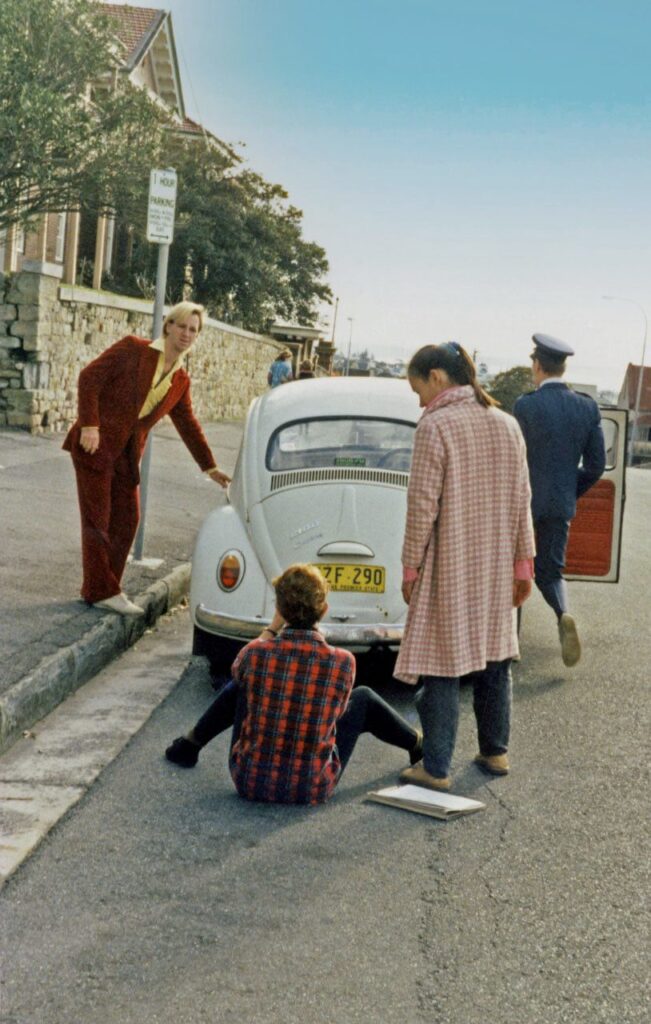
Watch The Castanet Club Comes to YOU!
After 30 minutes of technical issues on both sides Rob Darby finally get’s me on the phone. Cranky but always ready to talk with Rob Darby about a wide ranging group of issues.
None of which we solve. But I did bring the correct size soapbox.
Be loud, be proud and prepare ye for the third and final episode of Almost Live from the Castanet Club! from the now closed Castanet Club exhibition.
With current public health orders preventing visitors from experiencing our special exhibition The Castanet Club – An exhibition you can dance to! in person, we’re bringing the fun to you with this limited release variety show.
In true Castanet Club collaborative style, we’ve gathered talented musicians, videographers, sound engineers and visual artists to produce a modern take on a classic Novocastrian attitude: get your friends together, have fun, make art and share it!
We bring you a big finish with Newcastle legends Fish Fry getting us off to a roaring start with 24 Hours from Tulsa. Maynard and Zorica demonstrate Rodney Cambridge MBE’s Lamington Recipe (concluding it’s easier to go to the bakery). Finally, Nastassja Bassi haunts us from 1986 with a beautiful version of Wuthering Heights.
Watch The Castanet Club Comes to YOU!
The Castanet Club facebook page
Get your Castanet Club full colour 110 page book with over 200 photos you haven’t seen…
